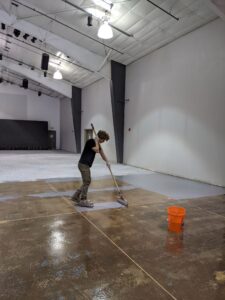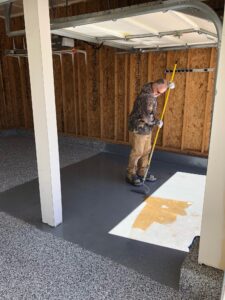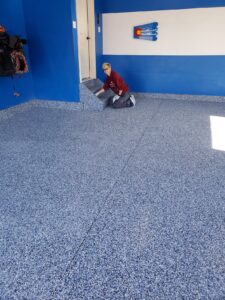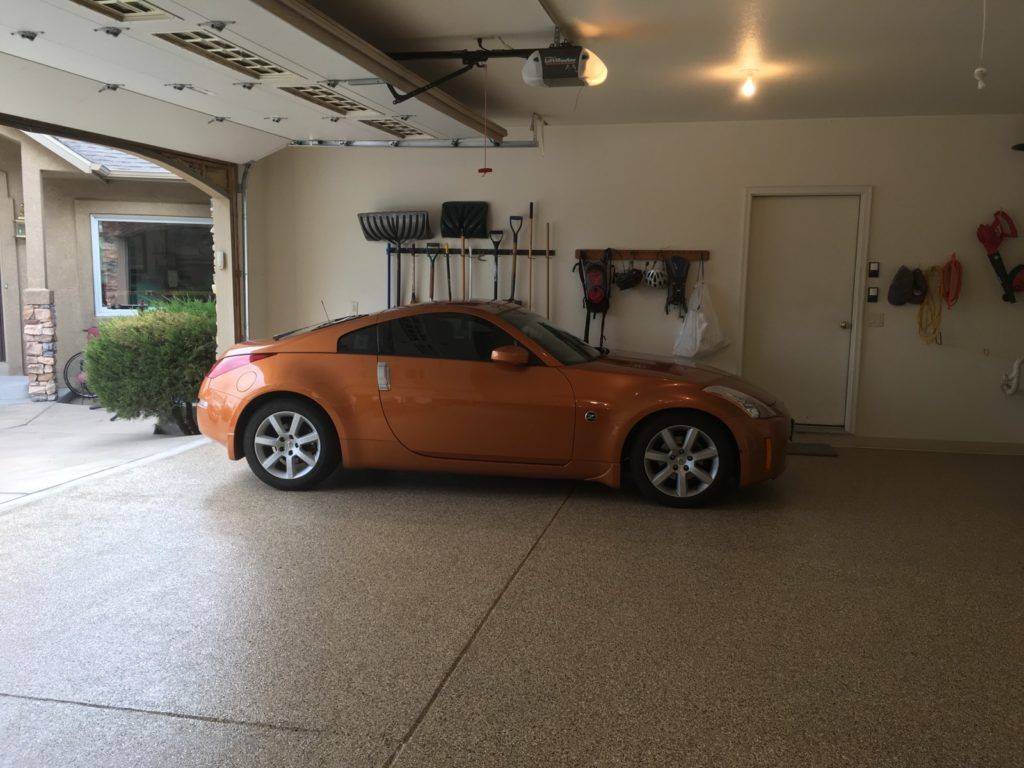Polyurea Coating vs Polyaspartic Coating for Garage Floor Coating
When it comes to selecting the ideal coating for your garage floor, the choices can sometimes be overwhelming. Two popular options that often come up in discussions are Polyurea coating and Polyaspartic coating. Both offer excellent protection against wear and tear, stains, and chemicals.
However, we have found that using of Polyaspartic provides exceptional durability and a longer-lasting finish compared to polyurea garage coating.
In this article, we will delve into the differences between these two coatings and explain why our company believes that our poly coating is the superior choice for garage floors.
Confusion Surrounding Polyurea Coating and Polyaspartic Garage Floor Coating

Polyaspartics are Polyureas – A little history and things to know about polyurea coating system
The first company that invented and received the first patents for Polyaspartic, Covestro, is the world-leading supplier of high-tech polymer materials. In the 1990’s Bayer Material Science (now Covestro), introduced Polyaspartic. Without trying to get too technical (if you want technical – see our supplier Slide-Lok’s blog on this), here is their statement.
“Per your request, we will clarify the differences between polyaspartic and polyurea …. By definition, a Polyaspartic polymer is an aliphatic polyurea because it is the reaction of an aliphatic polyisocyanate with an aliphatic diamine – the polyaspartic ester.”
Todd Williams, Technical Service, Covestro AG
Polyurea Coating and Polyaspartic Floor systems– they sound similar, are they?
Polyaspartic is a Polyurea
The key takeaway here is that polyaspartic polymers are a type of polyurea, an aliphatic polyurea to be exact. However, not all polyurea polymers are true polyaspartics. This is because a polyaspartic is only created when you use an aliphatic polyisocyanate reacted with an aliphatic diamine – the polyaspartic ester. Conventional polyurea polymers on the other hand can be created using aromatic polyisocyanates and amines.
Okay, sorry that did get a bit technical!
Here is the important part once you get past the technical:
Why is Polyaspartic Concrete Superior to Polyurea Coating
Aliphatic paints and protective coatings like Polyaspartics are light stable, and better at resisting yellowing from UV exposure (sunlight) because they don’t contain benzene rings. Aromatic compounds like conventional polyureas are susceptible to UV degradation.
Problems with Polyurea
Currently, there is no 100% aliphatic epoxy floor coating. Thus, all epoxy floor coatings and conventional polyureas contain aromatic compounds. They are subject to UV photodegradation, yellowing, and impaired mechanical and physical properties. Many coatings manufacturers claim UV stability in their epoxies, but all they have done is buy time. Studies show delayed UV degradation when using organic UV absorbers in epoxy formulations.
Which Should You Choose?
Remember when choosing your product – Aromatic coatings, which include epoxies and conventional polyureas are therefore not recommended for applications exposed to sunlight. This would mean your epoxy and polyureas are not recommended for concrete coating.
Both of these products have become increasingly popular choices. One of the advantages of our poly product is its wide variety of colors, allowing customers to choose the perfect shade to match their garage aesthetic. Additionally, our product bonds exceptionally well with the concrete, providing a durable and long-lasting finish. And our diamond bit grinding makes this bond even stronger.
Unlike epoxy coatings, which can be prone to chipping and peeling, our product offers better resistance to wear and tear. Furthermore, Polyaspartic provides a high level of protection against chemicals, stains, and is UV resistant.. With these benefits in mind, it is no wonder that our poly product has become the preferred choice for residential and commercial coating.
CONCLUSION: Polyurea vs Polyaspartic – Polyurea Floor Coatings Are Not Better Than Polyaspartics
In summary, if you’re being told “Polyurea coatings are superior to polyaspartic coatings” you should probably RUN. This is NOT TRUE as polyaspartics are a type of polyurea.
Anyone telling you that their product is superior to our poly is hoping you will not do your homework. If they are telling you it is the same, they are trying to confuse you. As we stated above if you want to get into more a technical description, read this article from our supplier, Slide-Lok.
The polyaspartic naming convention was used to differentiate it from other polyureas and polyurethanes that are inferior in performance. Don’t settle for a polyurea concrete coating as it is most likely aromatic polyurea and susceptible to UV degradation (yellowing). And it is prone to adhesion or wetting issues since those materials gel in seconds versus 30-60 minutes for polyaspartics. Polyaspartic, aliphatic polyurea, products are better for flooring applications.
Poly is popular even though it is a relative newcomer to the floor coating world. Polyurea garage floor coating has been around for longer, and in that time, it has proved itself to be an effective way to protect concrete floors from wear and tear. However, Polyaspartic floor coating, on the other hand, was developed specifically for industrial applications. It wasn’t until recently that it was adapted for use in residential settings.
So, what are the advantages of our poly products over polyurea coating? For starters, our poly floor product is much more durable than polyurea. It is also significantly more resistant to both heat and cold. This makes it ideal for use in garages, which can be subject to extreme temperature swings. In addition, our poly product is much easier to apply than polyurea. And finally, our Poly product dries much faster than polyurea coating, so you won’t have to wait as long to enjoy the benefits of your new floor.
Colorado Springs Garage Floors
When homeowners are deciding which type of product to use, and it comes to choosing between these products, several factors need to be considered. While both options offer fast cure times and provide excellent protection for concrete surfaces, the choice is clear.
Polyurea systems are known for their durability and flexibility, making them ideal for high-traffic areas, while our Slide-Lok poly coatings, being a type of polyurea, offer similar benefits but with the added advantage of transforming your garage or commercial space with a superior product. Moreover, both product types are superior to epoxy in terms of cure time and overall performance. Ultimately, it is crucial to assess the unique needs of the project and consult with professionals to determine the best product option for achieving optimal results.
These coatings are both options for floor coatings, but ultimately, our Slide-Lok poly is the superior option over pure polyurea products. It’s more durable and lasts longer, making the coating cost very reasonable. If you’re asking, where can I find Polyaspartic floor coating near me, just contact us today and we would be happy to help you get started! Colorado Springs Garage Floors would be honored to be your floor coating company!
This is why that is the only product we offer, and why we can offer a premium warranty.
See Our Process to Coat A Garage Floor
See Our Garage Floor Coating Work



